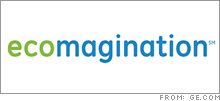The 500 gets religionWhy big companies are in the business of solving the world's woes.(Fortune Magazine) -- What business are you in?" Peter Drucker famously asked his clients. The wisest of all management thinkers knew that fundamental question was most important. If we could ask his question of the entire Fortune 500 today, the answer would be especially important because it isn't what it used to be. The implications of the change are considerable for all of America's big companies and for the country. Here's the change in a nutshell: Until recent years the Fortune 500 was in the business of solving people's problems. Now, increasingly, it's in the business of solving the world's problems.  A clear example of the old model was the corporate slogan of DuPont (Charts) for 60-plus years: "Better things for better living." It was a simple theory: Because of us you can have nylon stockings and Tyvek housewrap, and your life will be better. To see the new model, check what Ford (Charts) is promoting - not better things for better living, but "Better World." Ford happens to be playing up its work in hybrid technology and fuel efficiency, but in general the story is similar at many of the other biggest companies. Wal-Mart (Charts) is saying, "Change a light. Change the world," to promote the environmental advantages of fluorescent bulbs. The corporate slogan of Exxon Mobil (Charts) is "Taking on the world's toughest energy challenges." GE (Charts) says it's helping "solve some of the world's toughest problems." Notice a theme? What's happening is more than public relations, though it's definitely that. After the business scandals of 2001-03, big companies have been desperate to portray themselves as good citizens. But companies aren't just changing messages; in many cases they're also changing behavior. What's striking is that many large companies are finding it pays to take actions that benefit the customer not at all, but that benefit the environment or the larger society. Thus Starbucks (Charts) buys "fair trade" coffee at above-market prices not because it tastes better but because it helps poor farmers, which customers seem to appreciate. The millions of dollars that Gap, Nike and others spend monitoring their global supply chains for compliance with labor standards doesn't make the clothing any better. The willingness of Dell, Hewlett-Packard and others to take back their computers for recycling doesn't benefit customers, for whom it would be easier just to dump the PCs in the garbage. Yet such practices are all critical parts of those companies' business strategies. What's going on? A major part of the explanation is that we're an incredibly rich society. One must never minimize the plight of the poor, but the reality is that on the whole we live amid greater abundance than any nation has ever known, and that changes people's priorities. We can worry more about helping the world to the extent we can worry less about helping ourselves. Where that leads isn't clear, because this is a new model. Companies definitely aren't solving society's problems by taking care of employees the way they used to; we all know the trends in job security, pay, pensions and health-care coverage. But employers are trying to attract and hold employees in a new way that exactly parallels the change in how they're appealing to consumers: by giving more meaning to their lives. That's a deep shift in the way companies are managed. GE's Jeffrey Immelt, for example, will tell you that his company's Ecomagination initiative helps the company in all kinds of ways, but its most important effect is what it does for the employees. They're prouder to work for GE. An old-school cynic would respond that such a purpose doesn't put groceries on the table, and that's what employees need. It's certainly what some employees need. But that kind of thinking doesn't apply as broadly as it used to. Bottom line, we expect much more of the Fortune 500 than ever before, and many people have been happy to pay for it through these past five years of economic expansion. What happens when the recession arrives, and we aren't quite so rich? Customers may want more tangible benefits, and employees more groceries, yet now that they've been sensitized to Nicaraguan coffee growers and Pakistani labor practices, companies will have a tough time dialing back today's high expectations. The Fortune 500 is in a new business. It's worth asking whether it knows what it has gotten itself into. From the April 30, 2007 issue
|
Sponsors
|
